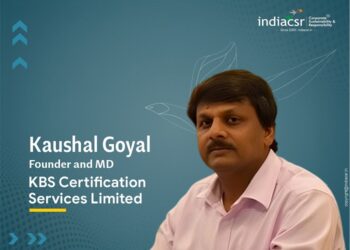In this detailed conversation, Garima Dutt, CEO of YES Foundation, unfolds the layers of the foundation’s commitment to economic and social development through their transformative initiatives. Focused on the 3Es—Employability, Entrepreneurship, and Environmental Sustainability—Ms. Dutt shares insights into the foundation’s philosophy, achievements, and future direction.
What is the guiding philosophy and mission behind YES Foundation’s work?
YES Foundation is driven by the belief that sustainable development can be achieved through collaborative efforts involving corporate houses, non-profit organisations, and local communities. Our mission is to inspire the youth of India to lead economic and social development by equipping them with relevant skills and entrepreneurial opportunities. The Foundation champions various initiatives focused on the 3Es – Employability, Entrepreneurship, and Environment Sustainability.
Provide an overview of YES Foundation’s Employability initiatives?
Under the Employability vertical, YES Foundation aims to address the skill gap in India’s workforce by providing market-oriented job skills training to underprivileged youth across various sectors. This includes technical skills specific to industries as well as soft skills like communicative English, basic computer knowledge, interview preparation, and personality development. In FY 2023-24, we trained over 4,000 youth across 6 states, ensuring at least 70% of the trainees secured placements after the program. Sessions from industry experts are also organised to provide practical insights and guidance.
How does YES Foundation support entrepreneurship, especially in rural areas?
YES Foundation recognises the importance of promoting entrepreneurship as a key driver for strengthening rural economies. We work closely with small and marginalised farmers, women, and artisans in 8 states, including Rajasthan, Gujarat, Madhya Pradesh, Maharashtra, Assam, Uttar Pradesh, Haryana, and Odisha. YES Foundation provides training on climate-resilient farming practices, agricultural inputs, and the promotion of handicrafts and handlooms. Additionally, we have built partnerships to support and promote nano-enterprises, with a particular focus on women. In FY 2023-24, we reached out to over 6,000 farmers, providing them with training and resources to adopt sustainable agricultural methods and to over 7,000 women and artisans, providing them entrepreneurship development trainings and market linkages.

What initiatives has YES Foundation undertaken to promote environmental sustainability?
YES Foundation has taken a multi-pronged approach to promote environmental sustainability. One of our flagship initiatives is the large-scale agroforestry project spanning 11 states across India. Through this project, we aim to enhance green cover, mitigate the effects of climate change, and support sustainable livelihoods for farmers. In FY 2023-24 alone, we planted 2 lakh trees, which have an estimated carbon sequestration potential of over 1.7 lakh tonnes of CO2 over the next 20 years. Our target is to plant 1 million trees within the next 5 years. Additionally, YES Foundation conducts walk-through energy audits for MSMEs to help them integrate sustainability into their operations, reduce carbon footprints, and enhance overall efficiency.
How does YES Foundation collaborate with local communities and stakeholders?
YES Foundation understands the importance of collaboration and community engagement for achieving sustainable impact. We actively partner with various NGOs, networks, and on-ground implementation partners to facilitate and scale up the initiatives. These partners play a crucial role in providing technical expertise, training, resources, and bringing together diverse stakeholders. For instance, our agroforestry project involves close collaboration with local farming communities, leveraging traditional knowledge and sustainable practices. The Foundation also engages in capacity-building initiatives for NGOs and CSR practitioners, offering training sessions on topics like proposal writing, skills-based volunteering, and the intersection of CSR with the Sustainable Development Goals (SDGs) and Environmental, Social, and Governance (ESG) factors.
What are some of the notable achievements and impacts of YES Foundation’s initiatives so far?
Through its multifaceted approach, YES Foundation has achieved significant milestones and created a positive impact across various segments of society. Our Employability initiatives have unlocked an economic potential of over INR 30 crores, while the Entrepreneurship initiatives have contributed to unlocking an economic potential of over INR 50 crores. Additionally, our efforts have helped reverse migration of youth in some regions by providing farming-based opportunities and supporting sustainable livelihoods. The Foundation’s agroforestry project and other environment sustainability initiatives have the potential to sequester over 1.7 lakh tonnes of CO2 over the next 20 years, contributing to India’s efforts towards climate change mitigation and land restoration.
How does YES Foundation ensure the long-term sustainability of its initiatives?
YES Foundation recognises the importance of long-term sustainability for its initiatives to have a lasting impact. One approach we take is to foster strong partnerships and collaborations with local communities, NGOs, and implementation partners. By involving these stakeholders from the beginning and leveraging their expertise and knowledge, the Foundation aims to ensure that the initiatives are well-grounded and can be sustained even after the initial project phase. Additionally, we focus on capacity-building and leadership development programs for our partners and beneficiaries, equipping them with the necessary skills and resources to continue the work independently. Lastly, we actively participate in various conferences and forums, sharing best practices and advocating for continued support from governments, corporations, and other stakeholders.
Can you highlight any unique or innovative aspects of YES Foundation’s approach?
One unique aspect of YES Foundation’s approach is its emphasis on promoting entrepreneurship and self-reliance among marginalised communities. Rather than adopting a purely philanthropic model, the Foundation empowers individuals, particularly women and farmers, to establish their own nano-enterprises. This not only provides them with sustainable livelihoods but also fosters a sense of ownership and self-sufficiency. Additionally, YES Foundation’s agroforestry project combines environment conservation with economic development, addressing both climate change and livelihood challenges simultaneously through innovative agricultural practices and native tree plantation.
How does YES Foundation measure and track the impact of its initiatives?
YES Foundation employs a comprehensive monitoring and evaluation framework to measure and track the impact of its initiatives. This includes collecting quantitative data on key performance indicators such as the number of beneficiaries reached, the number of jobs created, the number of trees planted, and the estimated carbon sequestration potential. Additionally, we conduct qualitative assessments through beneficiary interactions, case studies, and feedback from implementation partners. Regular progress reports and audits are also conducted to ensure transparency and accountability. The Foundation also actively participates in external evaluations and impact assessments conducted by independent agencies to gain valuable insights and identify areas for improvement.
What are the future plans and goals of YES Foundation?
YES Foundation will continue to be driven by our vision of an empowered and equitable India. Looking ahead, we will build on our 3Es focus and build further on our goal to catalyse employment and entrepreneurship opportunities for 100,000 youth by 2026, while retaining a strong focus on environment sustainability. Additionally, we aim to strengthen collaborations with various stakeholders, including government agencies, corporate partners, and not-for-profit organisations, to amplify our efforts and contribute towards strengthening the development ecosystem.
(India CSR)




















